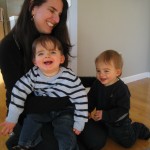Originally published on The Huffington Post Parents

In birthing twin boys two weeks shy of my 40th birthday, I have reverse-engineered a midlife crisis.
If the hallmarks of old-school crisis include leaving one’s spouse, buying a sporty car and dismantling all forms of stability in the name of freedom, then I’ve done mine backwards. Instead of cutting loose, I’ve stapled myself in place. At middle age, my husband Ken and I doubled down on our bond by mixing our DNA and witching up two new humans. Ken traded his two-seater for a “family sedan,” and many weekends, my idea of “freedom” translates as “permission to take a shower.”
Like many women “late” to motherhood, I wrestled with infertility, but unlike those who carried lifelong expectations of parenthood, for me, having kids meant rebellion. I’d always figured I wouldn’t, and into my 30s, my mother, who’d been seared by her midlife divorce from my father, applauded my plan to remain single and childfree.
As her friends’ kids mated and multiplied, she’d proudly comment that I was “skipping the starter marriage.” I savored my freedom and the safety it bestowed. “Don’t marry anyone who hasn’t been married before,” she would advise me. “You don’t want to be anyone’s first wife.”
Fast-forward to meeting, loving and marrying Ken (who had, in fact, been married before). Then came fraternal twin boys, now toddlers, through the painful grace of IVF. I’m happy in my marriage, lucky in this late-forming pack, and yet when Ken’s back goes out, rendering him immobile, I panic. His muscle spasm provokes my mental spasm. What if everything unravels? What if I have to do this kid-wrangling alone, forever? Plenty of people do. I’d always been harsh on my mother for her midlife overwhelm, how her sudden, unwanted divorce at age 40 changed her from a homework-hovering, lasagna-baking mom to an exhausted student and nervous dater. Now, I have a whole new understanding of what it means to do all the “heavy lifting” — although for me it’s been only physical, and only for a bunch of days.
Eventually, after my parents’ divorce, my mother and I found new rhythms, but the elemental message stuck: Family is the opposite of security. It’s like that high school exercise where kids tote an egg around for weeks, presumably to demonstrate the profound fragility of an infant. To me, that egg is the very idea of family. Everything can shatter.
This sense of tenuousness rears up uninvited. At a recent meeting of our local twins club chapter, a couple we barely know congratulated Ken and me on reaching the two-years-with-twins milestone. “And you’re not getting divorced!” they chortled.
I knew this was meant as off-color gallows humor to acknowledge the stress of raising multiples, but nonetheless, back at home I Googled “divorce rates for twin parents,” as if the Internet could pass final verdict. Maybe the statistics would require an emergency date night! Apparently, divorce among twin-folk is higher, but only slightly, around one percent. More to the point, Ken is as solid as they come — he’s the guy who does the “field changes” of diapers and the late night soothing of toddlers. He’s patient and funny when I’m hollow-eyed with fatigue, or boiling over with hormones, a north-of-40 reality far more hobbling than his troublesome back. He’s balm to my angst, the constant low-grade worry threaded through the knowledge that I’m blessed.
Somehow, my parents’ divorce still flavors my experience of midlife mothering. I like to think old hurts dissolve over time, but perhaps they quietly steep. Perhaps this isn’t even bad — the gratitude I feel for a family, along with the fear, is daily and acute. Maybe that’s what my mother meant about not marrying anyone who’s not divorced. Beyond the overt cynicism, loss has taught me to appreciate.
I’ve come to understand that this midlife crisis-done-backwards has created love, predictability and togetherness, which I treasure, as well as emotional elements of the old-school-type crisis, like radical uncertainty, identity disruption and excruciating vulnerability.
That’s why for me, this rather ordinary act of starting a family feels drastic. It’s not the female rebellion of a book like Eat, Pray, Love. My adventures unfold at home. I nuke day-old pasta for dinner and beseech the gods of naps. My idea of a good date is an in-house playdate with no one poking anyone’s eyes or demanding cheddar bunnies. Can I be permitted such simple pleasures, here at midlife? Can I, the child of divorce and a woman with infertility, claim such things? Can the echoes of the old crises fade, finally, or at least be outdone by Elmo, choo-choo trains and my boys laughing crib to crib?
Maybe in embracing this traditional life both my mother and I once disparaged, I pick up where she left off, starting a family at 40, the point where hers collapsed. Likewise, my mother has made her own shift.
Despite her long-term mockery of first marriage — she proudly recounts hocking her engagement ring for a MacBook — she’s an avid grandmother, and remarried to a formerly divorced man. While she once praised my courage in going it alone, she now doles out disapproval at my mothering: What’s with that swaddle thing? That looks like torture. Gilligan’s Island is not a lullaby. That’s child abuse. Have you considered whether the boys have ADHD?
“They’re toddlers, mom. They are supposed to have limited attention,” I answer her with the exasperated heat of a teen, defending my parenting, before returning to my 40-plus-year-old self, at peace with the imperfection.
Maybe mine is not a midlife crisis at all, but one from childhood, seeking now to resolve. Deep down, my own dream wasn’t freedom, but the family I’d lost. Maybe, too, family is far stronger than I’ve let myself believe.




